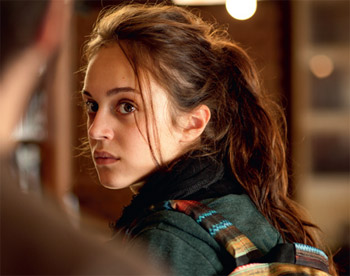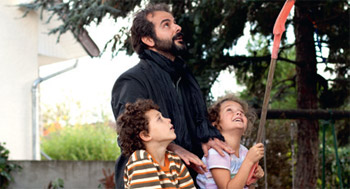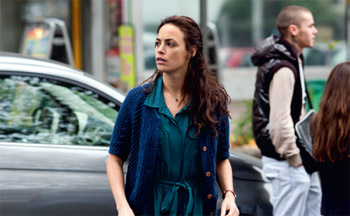Ali Mosaffa The Past Interview

Ali Mosaffa The Past Interview
Cast: Bérénice Bejo, Tahar Rahim, Ali Mosaffa, Pauline Burlet, Elyes Aguis, Jeanne Jestin, Sabrina Ouazani, Babak Karimi, Valeria Cavalli
Director: Asghar Farhadi
Genre: Drama, Mystery
Rated: PG
Running Time: 130 minutes
Synopsis: Following a four year separation, Ahmad returns to Paris from Tehran, upon his French wife Marie's request, in order to finalise their divorce procedure. During his brief stay, Ahmad discovers the conflicting nature of Marie's relationship with her daughter Lucie. Ahmad's efforts to improve this relationship soon unveil a secret from their past.
The Past
Release Date: February 6th, 2014
Interview with Ali Mosaffa
Question: When did you meet Asghar Farhadi for the first time?
Ali Mosaffa: The first time that I saw Mr Farhadi, he'd come to talk about a script to Leila Hatami, my wife. But I had followed his career and seen his films. I knew his work. We knew each other as two Iranian film professionals.
 Question: What's your background?
Question: What's your background?
Ali Mosaffa: I've been acting in Iranian films for 24 years. I started randomly. I was getting bored at the university and I was offered to act in a film. I went there just to clear my head. My first film was a 3rd zone commercial type of film. But then came my third film, PARI, directed by Dariush Mehrjui and being an actor took on a new meaning for me. I'd just been having fun until then. Meeting Mehrjui made me take cinema seriously.
Question: How did Asghar Farhadi talk you into the project?
Ali Mosaffa: I went through several auditions. A month before the shooting started, I wasn't sure I had the role. Being able to speak French was obligatory. Funnily enough, I still don't consider myself to be a French speaker. But I've always heard the language. I even started learning it a few years ago, then stopped, then started again and so on. French had become like a chronic disease I couldn't get rid of! A constant problem... My wife happens to speak French to our children at home. So for the past few years, French has played an increasing role in my life.
Question: How did acting in French affect your performance?
Ali Mosaffa: I've thought a lot about that. I heard something Mr Kiarostami said about his experience in Japan, shooting a film with actors whose language he doesn't understand. He said that in spite of the loss of a tool as a director, he'd gained a unique way of evaluating the acting. He was no longer duped by the language. He was able to perceive more accurately and more deeply the quality of acting. This can be applied to the actor too. When acting in a different language, you lose the weapon of your mother tongue which you can usually employ to cover some weaknesses in your acting, by the inflexion of your voice, by a mastery gained throughout your life. Without this weapon, you have no choice but to base your acting on primitive elements like your eyes, for instance.
Question: How would you define Ahmad?
Ali Mosaffa: He's an outsider in France. Although he's familiar with the culture and has lived here for 4, 15 or 20 years, it makes no difference, I think, he still remains a foreigner. Like many people from the East, he doesn't express his feelings directly. That's how his reactions must be understood and interpreted. This difference existing between the Iranians and the French can cause many misunderstandings. As for the rest of his personality, I'm not the kind of actor who tries to understand all the complexity of the character before performing the role.
Question: Did you and Asghar Farhadi imagine a past for Ahmad? Why he came to France the first time, how he met Marie…
Question: Is Ahmad's function to help the others speak and reveal certain things?
Ali Mosaffa: What's true about Ahamd is that he cares so much about these people, he can't help trying to help them sort out their problems. But this is not his natural tendency, he's not that involved in other people's lives and he doesn't feel he's able to help them solve their problems. He's involved only because of the affection he feels towards them. That is one of contradictions. If he cares so much about Marie's life, how could he leave her? That's his personality. He may be representative of a generation in Iran. Truthful people who care about others and wish they could help them. But the times don't encourage them in this way. They feel torn apart. Help the others, but to what extent? They try to preserve their own lives but they've been taught selflessness.
Question: Ahmad's expression is very soft…
Ali Mosaffa: I may speak slowly because it's in French. But in real life, even in Farsi, I do speak slowly and I'm a slow person. It's my way of being. But it's also a reaction. I feel the French speak very fast. I can't help behaving differently between actors who have something in common. So, the faster they speak, the slower I feel like speaking, even if I know my lines and I'm able to say them fast.
 Question: Is your character Asghar Farhadi's spokesperson? Does he for instance represent the gaze of an Iranian man on a French couple?
Question: Is your character Asghar Farhadi's spokesperson? Does he for instance represent the gaze of an Iranian man on a French couple?Ali Mosaffa: I don't think Asghar Farhadi wishes to have a spokesperson in the film. Based on what I know of his work and his approach, he would specifically avoid having anyone represent him, or making a film that would be a kind of a manifesto. Nevertheless, because this character is Iranian, he must have transferred more of himself on him than on the others.
Question: What was working with French actors like?
Ali Mosaffa: It was a very friendly atmosphere. I never felt like I was working with foreigners. I don't know if it's always the case, but with Bérénice, Tahar, Pauline, I really felt supported. Quite often, when I would make a mistake in French or say a wrong line and someone would come and correct me, Bérénice would try to minimize my mistake, saying I had a cute accent! I really felt they were looking after me as fellow actors. I really appreciated this professional solidarity that I felt in French cinema.
Question: Is a French shoot different from an Iranian shoot?
Ali Mosaffa: The principles are very similar. We must have borrowed a lot from French cinema. Although here, things are more formal, more substantial.
Question: Is The Past a French or an Iranian story?
Ali Mosaffa: I think the strength of this script is that it's neither French nor Iranian. It's a human story.
The Past
Release Date: February 6th, 2014
MORE
- Mission: Impossible Fallout
- Glenn Close The Wife
- Allison Chhorn Stanley's Mouth Interview
- Benicio Del Toro Sicario: Day of the Soldado
- Dame Judi Dench Tea With The Dames
- Sandra Bullock Ocean's 8
- Chris Pratt Jurassic World: Fallen Kingdom
- Claudia Sangiorgi Dalimore and Michelle Grace...
- Rachel McAdams Disobedience Interview
- Sebastián Lelio and Alessandro Nivola...
- Perri Cummings Trench Interview



